Interactive timeline Click here for full text history

Welcome to the Scott Trust interactive timeline, which shows the history of the Trust, the company and the Guardian from 1821 to the present day.
Select dates from the menu below.
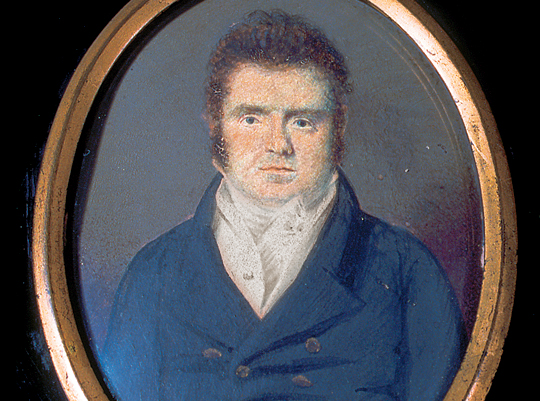
The Manchester Guardian is founded by John Edward Taylor as a weekly paper in the liberal interest. The paper first appears on Saturday 5th May 1821, priced at 7 old pence.
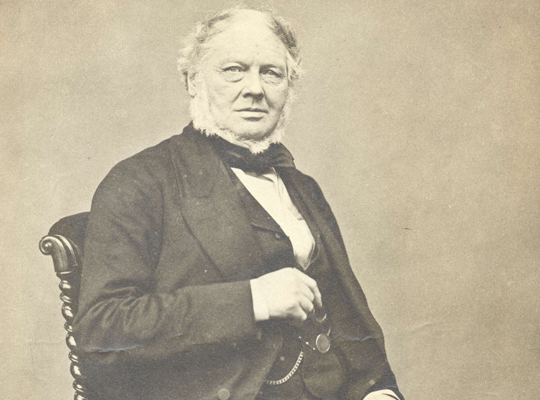
John Edward Taylor dies, passing on the editorship to his son Russell Scott Taylor, who shares the responsibility with Jeremiah Garnett (pictured). Garnett becomes the sole editor in 1848 when Russell Scott Taylor dies at 23.

Stamp Duty on newspapers is abolished, allowing the Manchester Guardian to publish daily, Monday to Saturday, at a reduced price of 2 old pence.

John Edward Taylor (younger son of the founder) becomes editor of the Manchester Guardian.

The Manchester Evening News is founded by Mitchell Henry as part of his campaign for election as a Manchester MP. The paper is sold soon afterwards to Peter Allen and his brother-in-law John Edward Taylor, son of the founder of the Manchester Guardian.
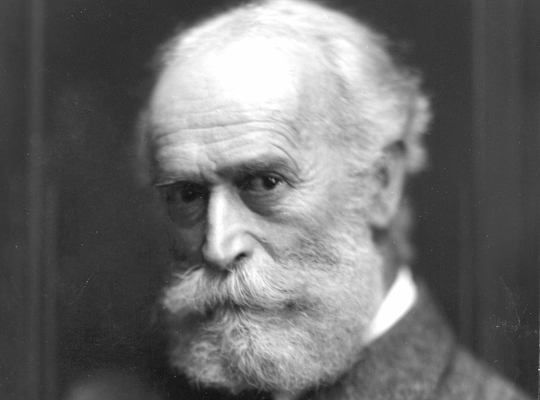
CP Scott joins the Manchester Guardian and becomes editor in 1872 at the age of 26. He holds the post for the next 57 years.

The Manchester Evening News moves into the same offices as the Manchester Guardian in Cross Street.

CP Scott buys the paper from the estate of John Edward Taylor (younger son of the founder), determined to own and run it as an independent newspaper and not for private gain. He is both owner and editor. The Manchester Guardian becomes a limited company.
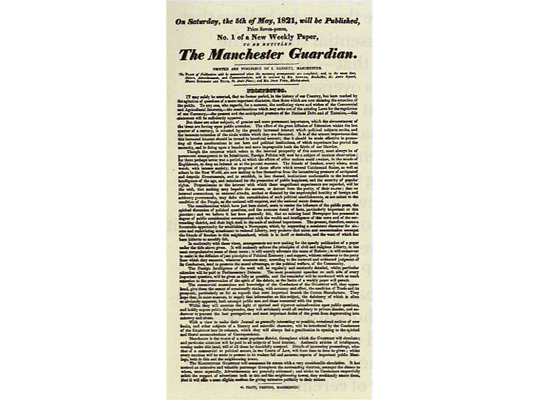
On 4 July 1919 the Manchester Guardian Weekly is launched with the aim of “presenting what is best and most interesting in the Manchester Guardian, what is most distinctive and independent of time, in a compact weekly form”.

John Russell Scott (son of CP Scott and by now manager of the Manchester Guardian) buys the Manchester Evening News, bringing both papers under the same ownership. The company that still exists today as Guardian Media Group is formed: The Manchester Guardian and Evening News Ltd. John Scott is chairman and governing director of the company.

CP Scott retires after 57 years as editor, and his son Edward (Ted) Scott takes over. Ted joined the Manchester Guardian in 1913, and had already made his mark as labour correspondent and a leader writer before taking on the editorship.

CP Scott dies in January 1932, followed only three months later by his son Ted, who is killed in a tragic boating accident. The future of the Manchester Guardian is thrown into doubt by the threat of death duties. William Perceival Crozier is appointed as editor in place of Ted Scott, a position he is to hold until his death in 1944.

Ownership of the Manchester Guardian is transferred to a trust to protect the newspaper from crippling death duties following the untimely death of Ted Scott. His brother John creates the Scott Trust to ensure the independence of the newspaper and the continuance of the journalistic principles of his father, CP Scott. John Scott is chair of the Trust until 1948.

The Manchester Evening News has the highest circulation of any provincial evening paper in the UK.

On WP Crozier’s death, Alfred Powell (AP) Wadsworth becomes editor. During his editorship the Manchester Guardian puts news on the front page in place of classified ads for the first time, and circulation more than doubles to over 168,000 copies a day.

The Trust is reconstituted in the spirit of the original agreement after legal advice suggests that the Guardian could still be threatened with death duties on the death of John Scott. The beneficiaries of the original Trust hand their shares over to the new trustees. The Scott family’s power to appoint trustees ends and the maintenance of the Trust becomes a collective act. AP Wadsworth becomes chair of the Trust.

John Scott (founder of the Scott Trust and governing director of the company) dies and his son Laurence Prestwich Scott becomes chairman and managing director of the company.

News replaces classified ads on the front page of the Manchester Guardian.
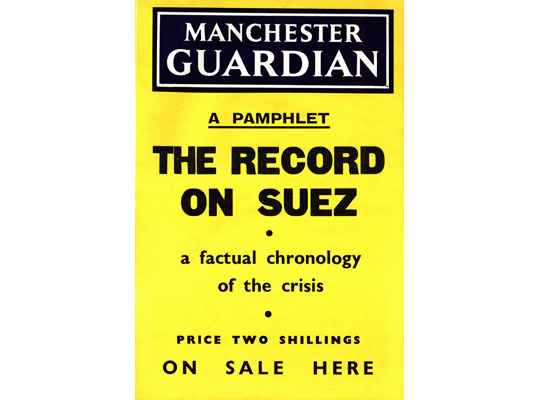
Alastair Hetherington becomes editor of the Manchester Guardian following the death of AP Wadsworth. In contrast to the majority of the British press the Guardian criticises the government’s military action in Suez. Richard Scott, son of Ted Scott and grandson of CP Scott, becomes chair of the Scott Trust.

On 24 August 1959 the newspaper changes its title from the Manchester Guardian to the Guardian, to reflect the growing importance of national and international affairs in the newspaper.

To enable swifter delivery of the Guardian to southern England the newspaper begins printing in London as well as Manchester on 11 September 1961. Difficulties with the printing system earn the newspaper the nickname “The Grauniad”.
The Evening Chronicle, Manchester’s other evening paper, is purchased by the company.

The Evening Chronicle is merged with the Manchester Evening News, creating the Manchester Evening News and Chronicle, the largest provincial newspaper in Britain.

The editor’s office and major editorial departments relocate from Manchester to London. The London office is in Gray’s Inn Road where the Guardian has been printing since 1961, and is shared with the Sunday Times.
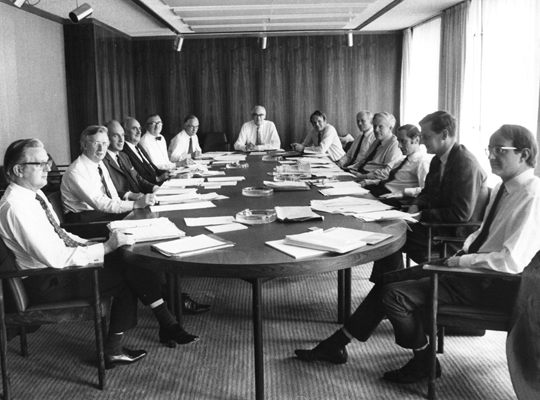
Guardian Newspapers Ltd and The Manchester Evening News Ltd are formed as wholly owned subsidiary companies of The Manchester Guardian and Evening News Ltd, each with their own board of directors.

A minority stake is purchased in Anglia Television.

On 29 August the Guardian’s Manchester office and the MEN move from Cross Street to new offices in nearby Deansgate. The Guardian had been written and printed from this office since 1886.

The name of the company is changed to The Guardian and Manchester Evening News Ltd (GMEN).

Sir Peter Gibbings becomes chair of the company, succeeding Laurence Scott. GMEN acquires 10% of Greater Manchester Independent Radio Limited, owners of Piccadilly Radio.

GMEN purchases the Rochdale Observer Series of newspapers.

Peter Preston succeeds Alastair Hetherington as editor, a post he is to hold for 20 years.

The Guardian moves from Gray’s Inn Road to its own offices at 119 Farringdon Road, which are to be home to the paper for the next 32 years.

The Stockport Express series of newspapers is merged with the Stockport Advertiser to form Lancashire and Cheshire County Newspapers Ltd (LCCN), with GMEN owning 50% of the merged company. In 1985 the remaining 50% is acquired by GMEN.

A controlling stake in Northwest Automart (later Northwest Autotrader) is purchased.
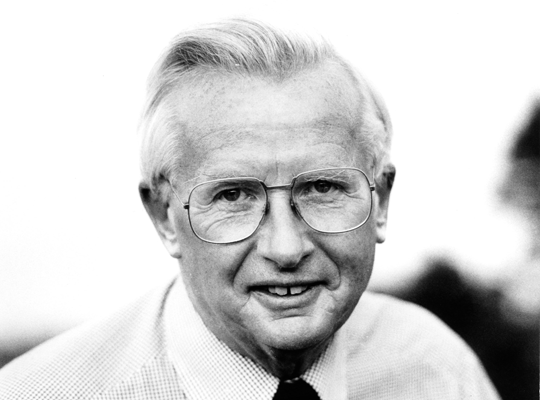
Former Guardian editor Alastair Hetherington succeeds Richard Scott as chair of the Scott Trust.

The Guardian’s new print centre at the Isle of Dogs is opened. The North East and Bristol Automarts are purchased, and a Scottish Automart launched as a joint venture.

The Guardian has a radical redesign, splitting the newspaper into two sections and introducing a new masthead. An international edition is launched in Europe and the Weekend section is published for the first time. The company is restructured into four divisions: the Guardian, Greater Manchester, Surrey and Automart.
Sir Henry John (Harry) Roche becomes chairman of GMEN, succeeding
Sir Peter Gibbings.

Automart division is renamed Auto Trader division, and now controls or has an interest in nine Auto Trader magazines. A minority stake is purchased in Broadcast Communications, a TV production company that later grows into GMG Endemol.

Hugo Young, Guardian columnist and senior political commentator, succeeds Alastair Hetherington as chair of the Scott Trust. GMEN acquires a holding in Trafford Park Printers alongside the Daily Telegraph, and printing at the Deansgate complex ceases. The company also acquires the Accrington Observer and a controlling interest in Broadcast Communications.

A collaborative bid for the UK’s independent breakfast TV franchise is successful and GMEN becomes a partner in GMTV (selling its stake in January 2000). The company has been steadily expanding its radio interests over the years and now owns 20% of the radio group Trans World Communications plc.

The Scott Trust formally sets out
its central objective for the first time: “To secure the financial and editorial independence of the Guardian in perpetuity: as a quality national newspaper without party affiliation; remaining faithful to its liberal tradition; as a profit-seeking enterprise managed in an efficient and cost-effective manner.” The Guardian launches Weekend as a colour magazine on Saturdays.
G2, the daily features tabloid section, is launched.

In June, the Observer, the world’s oldest Sunday newspaper, is purchased from Lonrho plc.
In November, GMEN changes its name to Guardian Media Group to reflect the breadth of its media properties.

Thames Valley Newspapers (owners of the Reading Evening Post and the Wokingham and Bracknell Times group of newspapers) is purchased by GMG from the Thomson Corporation.
The group’s radio interests are sold to Emap.
Auto Trader National Magazines is launched as a joint venture.

Alan Rusbridger is appointed editor of the Guardian and Peter Preston editor-in-chief of the Guardian and the Observer.
Auto Trader has expanded overseas and now has interests in Holland, Belgium, Australia, France and Ireland.
GMG becomes the majority shareholder in M&G Media in South Africa.
A stake is purchased in Golden Rose Communications, owners of Jazz FM.

The Guardian press centre in the Isle of Dogs is severely damaged by a terrorist bomb.
Both the Guardian and Auto Trader launch their first websites.

Sir Robert Gavron takes over as group chairman from Harry Roche, and Sir Robert Phillis joins the group as chief executive (succeeding Jim Markwick). The Guardian is the first national newspaper to appoint a readers’ editor, producer of the daily Corrections and Clarifications column.

GMG brings in Endemol Entertainment as an equal equity partner in Broadcast Communications (selling its 50% stake of GMG Endemol in 2000) and acquires a minority stake in Radio Investments Limited, which it holds until 2004.
The Guardian is named Newspaper of the Year for the fourth year running.

The Guardian Unlimited network of websites is launched in January 1999 (renamed guardian.co.uk in 2008). GMG Radio is established and applies for its first licence in South Wales. In 2000 Real Radio Wales is launched, followed by Real Radio Scotland and Real Radio Yorkshire in 2002.

Paul Myners becomes chairman of Guardian Media Group plc, succeeding Bob Gavron.
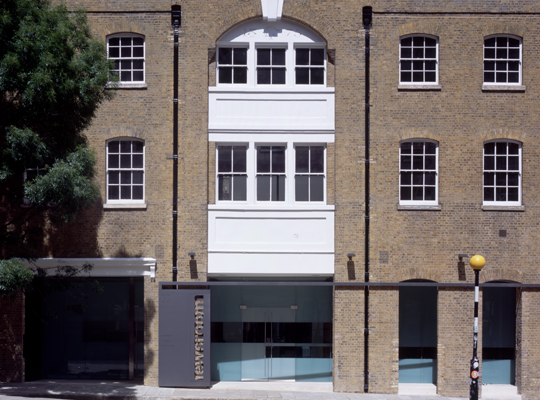
The Newsroom, the Guardian and Observer Archive and Visitor Centre, opens its doors. The centre preserves and promotes the histories and values of the newspapers through its archive, educational programmes and exhibitions. The Newsroom’s activities all transfer to Kings Place in 2008. GMG Radio acquires Jazz FM, later renamed Smooth FM.
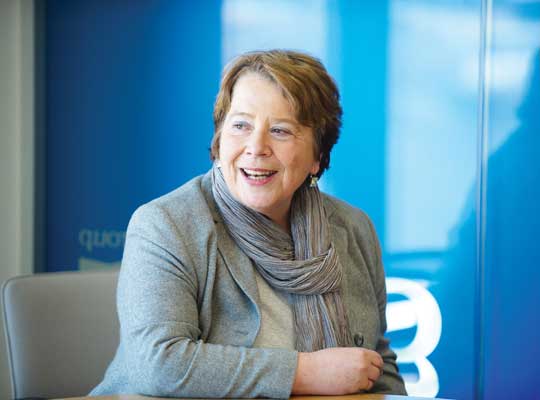
Liz Forgan becomes chair of the Scott Trust following the death of Hugo Young.
GMG becomes the sole owner of Auto Trader publisher Trader Media Group.

The new Guardian launches, with a ground-breaking design in a mid-size Berliner format. The Guardian becomes the UK’s first full-colour national newspaper, and the first UK national newspaper ever to adopt this size.

Sir Bob Phillis retires and is succeeded as GMG chief executive by Carolyn McCall, formerly chief executive of Guardian Newspapers Ltd.
Guardian Newspapers and GMG Regional Newspapers are renamed Guardian News & Media and GMG Regional Media to reflect their multimedia nature.
GMG Radio acquires Century FM and Saga Radio.
Comment is Free, now the UK’s biggest comment blog, is launched.

GMG sells 49.9% of Trader Media Group to Apax Partners in a deal that values TMG at £1.3 billion.

Guardian Media Group moves to its new home at Kings Place in North London.
GMG announces the acquisition of Emap’s business-to-business arm (now called Top Right Group) in partnership with Apax.
The Scott Trust becomes a limited company in order to strengthen the protection it offers the Guardian.
Guardian News & Media acquires ContentNext Media, the US business-to-business media company, which publishes the influential paidContent.org website

Amelia Fawcett, already a non-executive director of the group, becomes chair of GMG, succeeding Paul Myners.

GMG announces the sale of GMG Regional Media, publisher of the Manchester Evening News, to Trinity Mirror. The deal ends more than 80 years of common ownership of the Guardian and the Manchester Evening News.
Andrew Miller is appointed chief executive of GMG, succeeding Carolyn McCall.

Guardian News & Media announces plan to transform itself into a digital-first organisation
